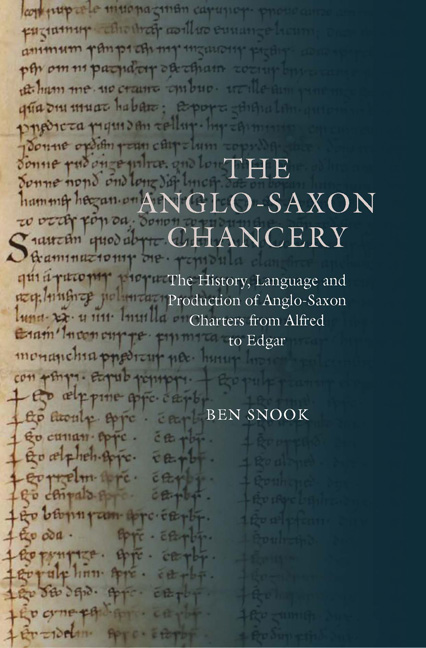 The Anglo-Saxon Chancery
The Anglo-Saxon Chancery Book contents
- Frontmatter
- Epigraph
- Contents
- Acknowledgements
- list of Abbreviations
- Timeline of Key Events between the Accession of Alfred and the Death of Edgar
- Introduction
- 1 Brave New World: The Charters of Alfred and Edward
- 2 Æthelstan
- 3 ‘Æthelstan A’
- 4 Turbulent Priests: Dunstan, Cenwald and Oda
- 5 Back to the Future: Edgar and ‘Edgar A’
- Conclusion
- Appendix I S 193
- Appendix II S 346
- Appendix III S 225
- Bibliography
- Index of charters
- Index
1 - Brave New World: The Charters of Alfred and Edward
Published online by Cambridge University Press: 05 May 2015
- Frontmatter
- Epigraph
- Contents
- Acknowledgements
- list of Abbreviations
- Timeline of Key Events between the Accession of Alfred and the Death of Edgar
- Introduction
- 1 Brave New World: The Charters of Alfred and Edward
- 2 Æthelstan
- 3 ‘Æthelstan A’
- 4 Turbulent Priests: Dunstan, Cenwald and Oda
- 5 Back to the Future: Edgar and ‘Edgar A’
- Conclusion
- Appendix I S 193
- Appendix II S 346
- Appendix III S 225
- Bibliography
- Index of charters
- Index
Summary
George Godfrey Cunningham, in the first volume of his Lives of Eminent and Illustrious Englishmen, published the year after Queen Victoria's accession, eulogised Alfred (his first eminent and illustrious Englishman) in a tone which has since become all too familiar: ‘england’, he wrote, ‘has had no monarch, or patriot, of whom she has more reason to be proud, nor indeed does the history of any nation record a more perfect character, than this Anglo-Saxon sovereign.’ A little more than half a century earlier, no less a figure than David hume had adopted a similar tone in his own acclamation of Alfred's achievements. He thought Alfred ‘the greatest prince after Charlemagne that had appeared in europe during several ages […] one of the wisest and best that ever adorned the annals of any nation’. yet, hume, ever the sceptic, also harboured suspicions about Alfred's impeccable character:
fortune alone [he wrote] by throwing him into that barbarous age, deprived him of historians worthy to transmit his fame to posterity; and we wish to see him delineated in more lively colours, and with more particular strokes, that we may at least perceive some of those small specks and blemishes, from which, as a man, it is impossible he could be entirely exempted.
Thanks largely to the work of his biographers, both medieval and modern, Alfred has become an immovable monolith, towering over the historical landscape not just of the ninth century, but of the whole Anglo-Saxon era. Discussions of almost any aspect of english history, literature or material culture in the final decades of the ninth century have tended to start and finish with him. Indeed, the view of Alfred as an ‘eminent and illustrious englishman’, an almost messianic saviour of his country, a patriarch, a visionary, a warrior king, a devout Christian, a defender of ‘Anglo-Saxon liberty’ and an all-round good chap, that was constructed so fastidiously by his first biographer, Asser, has been inherited by successive generations of commentators and critics with, as hume noted, remarkably little modification.
- Type
- Chapter
- Information
- The Anglo-Saxon ChanceryThe History, Language and Production of Anglo-Saxon Charters from Alfred to Edgar, pp. 29 - 56Publisher: Boydell & BrewerPrint publication year: 2015
